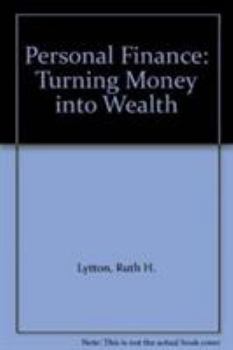Personal Finance: Turning Money into Wealth
No Synopsis Available.
Format:Paperback
Language:English
ISBN:0130447773
ISBN13:9780130447777
Release Date:May 2002
Publisher:Prentice Hall Canada
Length:245 Pages
Weight:1.90 lbs.
Dimensions:0.4" x 0.4" x 0.4"
Customer Reviews
4 ratings
Well done
Published by Thriftbooks.com User , 15 years ago
This book came quickly and was in the condition described. I am very happy with this product.
Excellent Primer on Where Your Money Goes
Published by Thriftbooks.com User , 16 years ago
I don't generally keep textbooks but this is one that I will hold onto for quite some time. This book has been completely worth it and I keep referring back to it as I have been out of college.
Great service
Published by Thriftbooks.com User , 17 years ago
This book was sent in a timely manner and was in excellent condition as stated.
Superb text on a vital topic- basics everyone should know
Published by Thriftbooks.com User , 19 years ago
Personally, I think that we would all be better off if we spent more time in our education process teaching people about the realities of their economic lives. This is especially true of their choice of careers, managing those resources, and preparing for their "golden years". I could nominate a few topics I think we could cease teaching in order to have room for the necessary classes to provide people with real life financial management skills that can have a direct impact on the improvement of all aspects of their lives. This book, "Personal Finance - Turning Money into Wealth" is a fantastic tool for students and ANY interested reader. I wish everyone would work through this book (or one very much like it). While it is never too late to develop these skills, the younger a person gets a plan for their economic life in place, the more power it has and the better off they will be long term. I like the way Prof. Keown emphasizes basic principles (he has 15 of them) and planning. He begins the book by providing the foundation of financial planning, teaching the student how to measure their financial health and using that to inform their plan, understanding the Time Value of Money (a topic so vital that no one should graduate high school without knowing, in my opinion), and the basics of tax planning. The author then provides some great information on managing money by understanding the realities of cash and liquid assets, credit cards (open credit) and the traps it represents, using consumer loans in PLANNED BORROWING (another important topic that is almost unknown to most consumers because of the misuse of open credit), and buying homes and automobiles. I really enjoyed his next discussion on insurance. He talks about the various kinds of insurance, the kinds of protection they provide at what costs, and especially the situations in which buying insurance makes sense and when it does not. The section on managing investments is good, solid, but BASIC information. Anyone doing anything beyond a few basic retirement plans will need to study other materials. This section is the one where I have a tiny quibble with the author. He differentiates investing and speculation by saying that investing involves putting money in assets that provide returns - stocks, bonds, etc - but that speculating is putting money in things like baseball cards that only have a price based on what others are willing to pay. I sort of understand what I think he is trying to say. However, all investing is in some sense speculating. The buyer and seller have different views of the future (speculating about the future) and so they make opposite choices at a certain price. Either of them would change their view, presumably, at some other price. Stocks do not have a built in return and many do not pay dividends and too often nowadays their residual value is zero. Too often people buy stocks simply because they are going up (the greater fool theory) and get b




